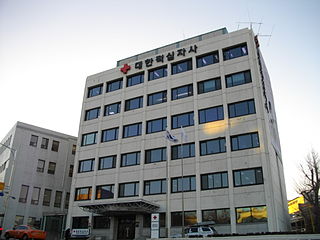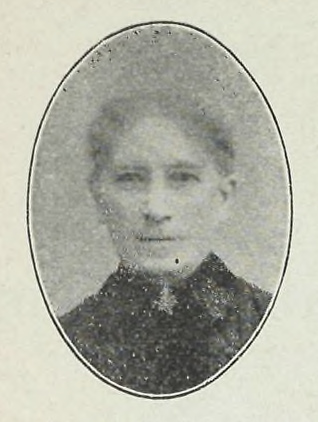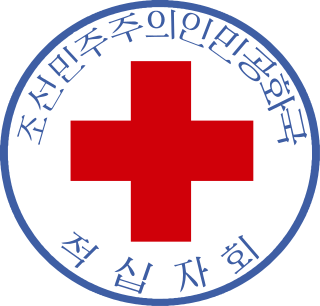Related Research Articles

Ahn Changho, sometimes An Chang-ho was a Korean independence activist and one of the early leaders of the Korean-American immigrant community in the United States. He is also referred to by his pen name Dosan. A Protestant social activist, he established the Shinminhoe when he returned to Korea from the US in 1907. It was the most important organization to fight the Japanese occupation of Korea. He established the Young Korean Academy in San Francisco in 1913 and was a key member in the founding of the Provisional Government of the Republic of Korea in Shanghai in 1919. Ahn is one of two men believed to have written the lyrics of "Aegukga", the South Korean national anthem. Besides his work for the Independence Movement, Dosan wanted to reform the Korean people's character and the entire social system of Korea. Dosan's key efforts were in educational reforms and modernizing. He was the father of actors Ralph, Philip Ahn, and US Navy Lieutenant Susan Ahn Cuddy, who also later worked for the Office of Naval Intelligence, the National Security Agency, the Library of Congress, and the US Department of Defense.

Duksung Women's University is a private university in Seoul, South Korea founded in 1920.
The Independence Association was founded through the initiative of Philip Jaisohn on July 2, 1896. At its founding it was recognized by the Korean Ministry of Foreign Affairs. Despite some remarkable achievements, by the late nineteenth century Korea found itself wholly unable to resist, or even properly comprehend the encroachments of foreign powers. Japan's victory in the First Sino-Japanese War had both removed the Chinese from the peninsula and exacted an acknowledgment of Korean independence, but the country's independence was fragile, with Japan, Russia, and other powers vying for influence. The group was founded by reform-minded citizens, and worked to strengthen Korean independence, promote national self-strengthening, create a public sphere, and advocate democratic participation in government decisions. The club published a newspaper, Tongnip Sinmun, and worked to create symbols of Korean independence. It supported public education, journalism, and language reform. Its political program for reforming the government into a constitutional monarchy brought it into conflict with the Emperor and conservatives in the court, and the club was ordered to disband in December 1898.

Anarchism in Korea dates back to the Korean independence movement in Korea under Japanese rule (1910-1945). Korean anarchists federated across their end of the continent, including forming groups on the Japanese mainland and in Manchuria, but their efforts were perforated by regional and world wars.

The status of women in North Korea is not fully understood outside the country, due to the political isolation of North Korea, the unwillingness of the North Korean authorities to allow foreign investigators access in the country, and the existence of conflicting reports. The official position of the North Korean government is that women have equal rights with men.

Women in South Korea have experienced significant improvements for social changes in recent years, compared to previous times, when Confucianism was deeply imbued in the culture. In today's society, the economy of South Korea has tremendously improved due to urbanisation, industrialisation, military authoritarianism, democratic reform, and social liberalisation since the late 1960s. Thus, gender roles and gender identities eventually have been modified as a result to changing modernity. More than half(in 2018 OECD economy survey, it was 56.1%. It is lower than OECD average.) of Korean women are employed and furthermore, more than 25% of married women are employed as full-time workers. In politics, although there are not as many female politicians as male politicians, the female politicians have recently begun to participate more actively than in the past. For instance, in the National Assembly, women occupy 20 of the 299 seats, less than 10%. In 2020 parliamentary election, women occupy 57 seats in the National Assembly. It is the largest number of seats ever.

The Republic of Korea National Red Cross is a humanitarian organization that provides emergency assistance, disaster relief and education inside South Korea. It is the designated South Korean affiliate of the International Federation of Red Cross and Red Crescent Societies.

Mary Fletcher Benton Scranton was an American Methodist Episcopal Church missionary. She was the first Woman's Foreign Missionary Society of the Methodist Episcopal Church representative to Korea and the founder of the Ewha Girls School under Emperor Gojong. Today, the Ewha Girls School is the Ewha Womans University, one of the most prestigious women's schools in Asia. Scranton also founded the Tal Syeng Day School for Women in Seoul and the Training School for Bible Women.
The anti-nuclear movement in South Korea consists of environmental groups, religious groups, unions, co-ops, and professional associations. In December 2011, protesters demonstrated in Seoul and other areas after the government announced it had picked sites for two new nuclear plants.

The Korean Children's Union (KCU) is the precursor to the Socialist Patriotic Youth League of North Korea contributing to North Korean youth movement and pioneer movement. It is for children aged six to fifteen and is a political organisation linked to the Workers' Party of Korea. Its uniformed branch is known as the Young Pioneer Corps, which admits children and pre-teens ages nine to 15. The organization operates chapters in elementary and secondary schools nationwide. It teaches children about Juche, and other ideologies behind the North Korean system. Youth above the age of 15 may join the Socialist Patriotic Youth League.
Good News Mission is a South Korean Christian-based new religious movement founded in 1971 by pastor Ock Soo Park. It is one of several new religious movements in Korea referred to as Guwonpa.

The Red Cross Society of the Democratic People's Republic of Korea is the national Red Cross Society of North Korea. It was founded as the Red Cross Society of North Korea on 18 October 1946 by the Soviet-backed occupational government.
Feminism in South Korea is the origin and history of the movement of feminism or women's rights in South Korea.

The Socialist Women's Union of Korea is a mass organization for women in North Korea. Founded in 1945 as the North Korea Democratic Women's League, it is the oldest and one of the most important mass organizations in the country. The Union has committees on every level of administrative divisions of North Korea, from ri (village) all the way up to provinces.
Hoesik is a popular type of gathering in the society of South Korea, and refers to a group of people getting together to eat and drink. In Korean society, Hoesik has been established as a subculture of an organization or enterprise.
Hong Son-ok is a senior North Korean politician. She has served as the Vice Chairwoman of the Presidium of the Supreme People's Assembly (SPA) and Chairwoman of the Committee for Cultural Relations with Foreign Countries. These posts took her to many foreign countries and meetings with foreign dignitaries. In 2013 she became the first female to be appointed Secretary General of the SPA Presidium. She served in that capacity until 2018. Hong has chaired many of North Korea's friendship associations with foreign countries.

The Orcadian Women's Suffrage Association was an organisation involved in campaigning for women’s suffrage, based in Orkney, Scotland.
Chanyang-hoe or Chanyanghoe was a Korean feminist organization, founded in 1898. It has been referred to as the first women's organization in Korea. It aimed to erase the traditional discriminatory Confusian gender segregation by women's education. It has been called the beginning of the women's movement in Korea.
Yo-u-hoe, Korean women's organization, founded in 1899.
References
- ↑ The Korean Mind: Understanding Contemporary Korean Culture
- ↑ Boye Lafayette De Mente: The Sensual Side of the Orient -- An Armchair Guide for Travelers
- ↑ Kyung Ae Park (June 1992). "Women and Social Change in South and North Korea: Marxist and Liberal Perspectives" (PDF).
{{cite web}}: CS1 maint: url-status (link)